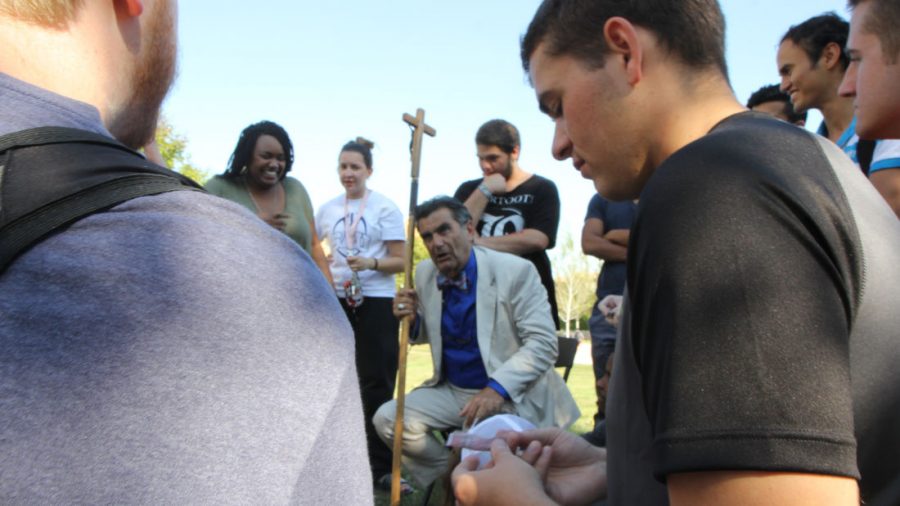Students petition free speech area policy
Brother Jed, Campus Minustry USA member, speaks to a group of students Sept. 14 in the Martin Luther King Jr. Commons. The commons is a designated free speech area, according to NIU policy.
October 1, 2015
The NIU Young Americans for Liberty has started a petition against NIU’s free speech and solicitation area policy, claiming it to be unconstitutional.
The policy states “Northern Illinois University policy prohibits solicitation or leafleting anywhere on campus with the exception of the Free Speech Area on the Martin Luther King [Jr.] Commons, between the Holmes Student Center and Founder’s Library.”
Students must notify Student Involvement and Leadership Development and register with NIU police prior to using the Martin Luther King Jr. Commons. So far, the group has received 195 signatures on the petition at actionsprout.com, a petition and cause site.
“I’m a big believer of the constitution,” said sophomore finance major Jeremy Watson, president of the NIU Young Americans for Liberty. “It should be respected. My main problem with it is that you have to go through a process of being approved and are limited to one area. You’re in competition with other organizations also. Organizations want that spot because it’s the only free speech area on campus.”
Mark Cordes, interim dean and law professor of the College of Law, said the policy could be argued as infringement on students’ constitutional rights because of the limitations against two forms of speech.
“Leafleting is considered a traditional form of communication in America,” Cordes said. “Courts do protect the ability to hand out information. It’s essential to be able to hand out literature. So, yes, you can put reasonable regulations for people to do that. But is it reasonable? There’s a good chance the court will say no.”
Students have full First Amendment rights, but the government can impose content neutral time, place and matter restrictions within reason, Cordes said. The gray area comes with defining reason, Cordes said.
The policy is “out of respect for individual privacy and peoples’ right to engage or not engage as they see fit,” according to a statement by the Division of Marketing and Communications. “The university has designated an area within MLK Commons as a central location for organized events. We see no conflict between establishing this area for organized discussion and respect for the principle of free speech.”
People should expect to endure some interference in order for others to exercise free speech, as this enables each individual to have a say, Cordes said. Free speech becomes unreasonable when it restricts the movement of others or is harassment, Cordes said.
“I believe freedom of speech should be everywhere,” said Le’Jera Payton, freshman political science major. “They [people who exhibit offensive speech] have their rights too.”
To make the policy less subject to constitutional challenge, Cordes said the policy should be changed to allow leafleting and soliciting throughout a majority of the campus while restricting harassment and interference of movement to protect students’ rights.
The NIU Young Americans for Liberty plans on continuing to petition until the group attains 500 signatures. Watson said the group wants the administration to take the petition seriously.
“My goal is to get rid of the free speech zone and make the entire campus a free speech zone,” Watson said. “There should be no policy.”







